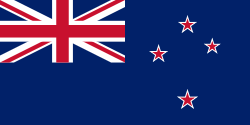| New Zealand at the 1936 Summer Olympics | |
|---|---|
 | |
| IOC code | NZL |
| NOC | New Zealand Olympic and British Empire Games Association |
| Website | www |
| in Berlin | |
| Competitors | 7 in 3 sports |
| Flag bearer | Jack Lovelock (athlete) |
| Officials | 1 |
| Medals Ranked 20th |
|
| Summer Olympics appearances (overview) | |
| Other related appearances | |
New Zealand competed at the 1936 Summer Olympics in Berlin, Germany. The team of seven competitors, all men, took part in nine events in three sports at the Games. [1] Late in the process, Arthur Porritt was appointed manager of the New Zealand team. [2] [3]